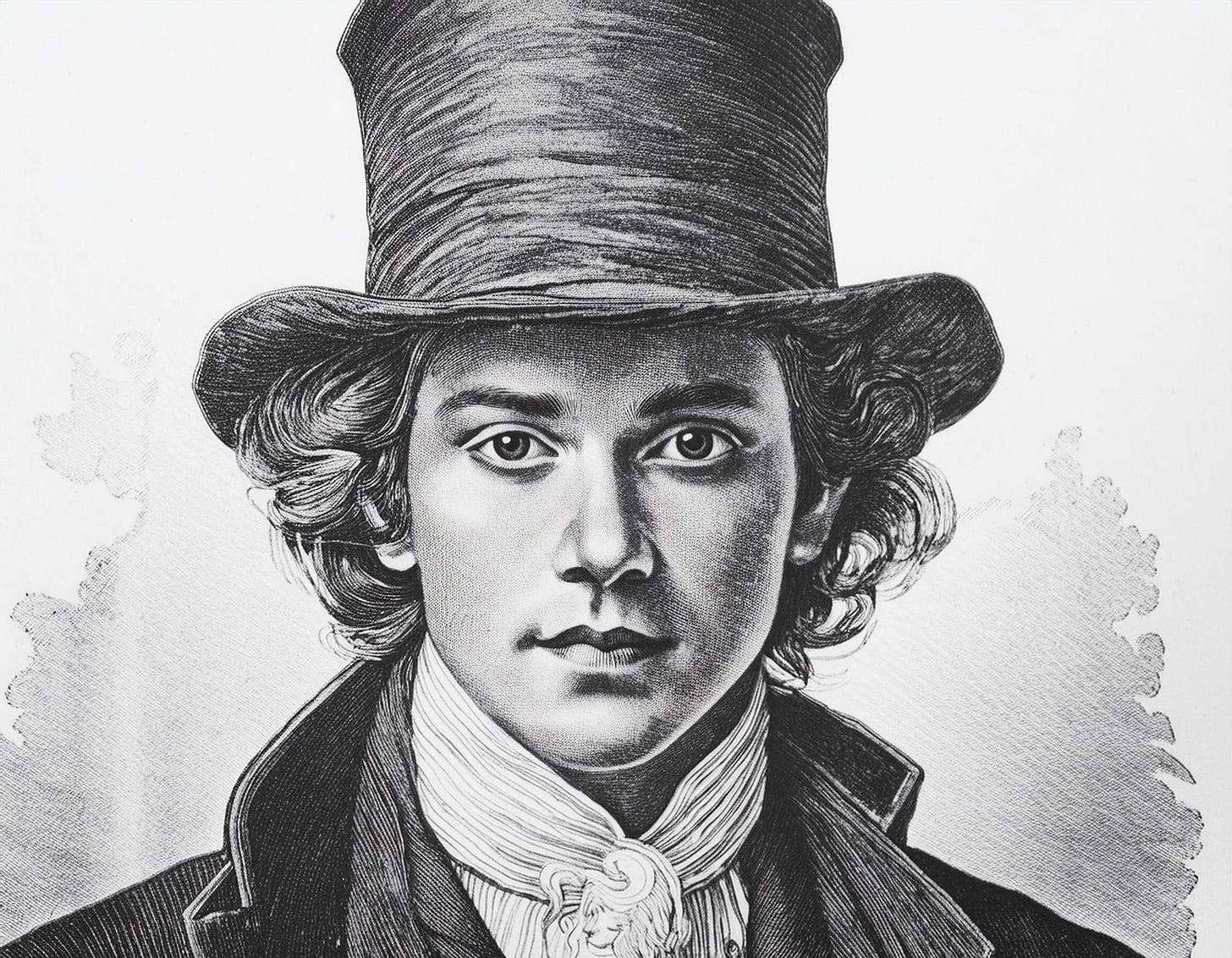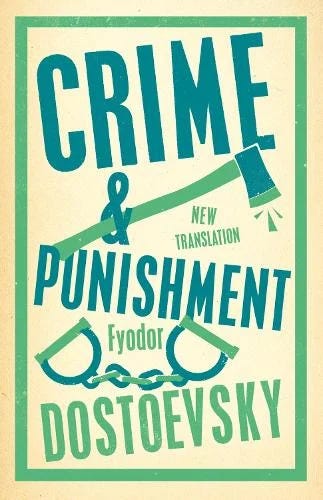An Exceptionally Hot Day in St Petersburg
Crime and Punishment Week 1: Part One, Chapter 1.
Welcome to Crime and Punishment!
Well, hello there! I’m so glad you’ve decided to join my slow read of this epic Russian classic. Some of you will be coming over from the read-along that I started a few weeks ago on The StoryGraph, and some of you will be completely new. The original read-along will continue and will remain seven weeks ahead, but I wanted to move over to Substack to enhance the experience.
Crime and Punishment is firstly a crime thriller—not so much a whodunit as a whydunit. I like to think of it as a 19th-century Russian version of a Columbo episode, where we, the audience, know who the murderer is and go through the story wondering if he’ll get away with it. We go deep into the murderer's psyche as we follow his monologues and behaviour before and after the crime.
You might think that classics are intimidating. Maybe you think they’re too high-brow, that you’ll struggle. Well, this novel isn’t like that at all. If you enjoy crime fiction, whether it be Ian Rankin’s Rebus novels, or the excellent Girl with the Dragon Tattoo series from Stieg Larrson, or Jo Nesbø’s Harry Hole series, there’s a very good chance that you’ll enjoy Crime and Punishment.
The Crime and Punishment homepage will be updated each week with chapter summaries and analysis and a link to a weekly chat thread for each chapter. New weeks will start on Mondays. See the reading schedule for chapters and dates. There is also a cast of characters page that outlines in which chapters each character appears and provides a summary of what they get up to.
Quick question
This week’s characters
Characters in this week’s chapter in the order that they are mentioned:
Chapter 1 Synopsis
All quotations in this post are taken from Roger Cockrell’s translation of 2022, Alma Classics, © Roger Cockrell 2022
Raskolnikov leaves his tiny room on an exceptionally hot day at the beginning of July. We quickly learn that he is ‘crushed by poverty’ and is in debt to his landlady for back rent. He has stopped engaging in life in any meaningful way.
We’re introduced right away to the idea that Raskolnikov is off to do something, but we don’t know what. He refers to it in his inner monologue as ‘that’.
“Here I am wanting to do that… Am I really capable of doing that? Can that be serious?
He follows it up with some philosophy, so we’re primed early on that something is going down and that there might be a philosophical reason behind it.
“Hmm, yes… man is capable of doing anything, and yet he lets it all slip by him simply out of cowardice… it’s a universal principle… What is it, I wonder, that people are most afraid of? Taking a new step forward, saying something new – that’s what it is…”
I don’t think it’s much of a spoiler to say that he’s referring to murder when he talks about ‘that’. He believes himself capable of taking that ‘new step forward’. I get the feeling that he’s hoping for some kind of redemption, that by taking this step, he’ll somehow find the meaning and purpose in his life that are so lacking. Is it an egotistical move to break through his malaise? He’s been lying around his room all summer thinking about this murder. First it’s on, then it’s off. Then it’s back on. He seems torn.
“Am I really capable of doing that? Can that be serious? No, not serious at all. It’s simply some fantasy to keep me amused, some game I’m playing! Yes, maybe it’s just a game!”
And we read that his ‘heart had become so full of malicious contempt…’. He’s in a dark place.
Is it his being ‘crushed by poverty’ that’s causing his deep ennui? The narrator tells us that he’s afraid of meeting anybody, let alone his landlady, but then says that ‘his straitened circumstances were no longer a burden to him because he’d stopped engaging in day-to-day concerns, or wanting to do so’. But then, as he walked out onto the street, ‘he was struck precisely by how worried he was about meeting his landlady’. And all this on the first page! It’s our first glimpse into how torn he is, how split.
We know he’s planning a murder, but we don’t know who the intended victim is. We’ve learned a little about his state of mind. And now we know that he hasn’t planned it terribly well. As a cart-horse goes past, a drunk calls out to him about his hat from Zimmerman’s. He’s conspicuous. That’s a problem.
“It’s the little details, the tiny little details that matter… It’s the little details that always ruin everything…”
He does know one pointless detail, though: how many steps it is between his tenement building and the victim’s—exactly 730. We learn this when we’re told that he’s on his way to a rehearsal of the crime, a reconnaissance mission.
We’re introduced to the victim as she peers through a crack in her door in response to Raskolnikov’s ringing the bell. She’s one Alyona Ivanovna, an old pawnbroker of around 60. We get a brief mention of her sister, Lizaveta, when Raskolnikov comments inwardly that it must’ve been she who cleaned the apartment to make it so spick-and-span. He thinks of Alyona Ivanovna as a ‘spiteful old widow’.
We learn that this pledge he’s brought to pawn is not his first. His earlier pledge has already expired, and he now owes interest on it. That interest is deducted from what Alyona Ivanovna offers him for his father’s watch, and she also takes the interest from the watch in advance. Raskolnikov almost leaves in disgust, but then remembers that he’s not really there about the watch and takes the measly 1 rouble, 15 copecks.
He leaves feeling short-changed by what the pawnbroker gave him. As he’s leaving, he asks after Lizaveta, obviously fishing to learn when she might next be out. But Alyona Ivanovna is having none of it and basically tells him that it’s none of his business.
He leaves in a state of mental anguish in this beautiful piece of writing (and translation):
The feeling of boundless disgust that had begun to oppress and torment his heart while he was on his way to see the old woman now reached such a pitch and expressed itself with such clarity that he had no idea where he could hide from his sense of anguish. He walked along the pavement as if drunk, bumping into passers-by without noticing them, not coming to his senses until he was in the next street.
That sense of anguish, of hypochondria, is eating him up so badly that he’s completely lost his wits. Can you imagine what it must be like to plan a murder that feels morally justified, to go through a rehearsal, and to be torn—or split—between calling it off as a bad job or actually going through with it? Dostoyevsky didn’t choose Raskolnikov’s name willy-nilly—it derives from the Russian verb raskolit’, meaning ‘to split’. And in the eight pages of Chapter 1, we’ve been given a very good sense of the schism in Raskolnikov’s mind.
Punishment
Let’s take a look at the punishment angle. We get the sense that the punishment for his crime has already begun. This ‘hypochondria’ from which he suffers isn’t the condition we now know as illness anxiety disorder or health anxiety, where sufferers have a persistent fear that they have a serious or life-threatening illness despite few or no symptoms. Cockrell defines hypochondria in his footnote: ‘In the medical language of the time, a pathological condition akin to melancholy, verging on depression.’
So there’s some kind of mental health issue going on in Raskolnikov. When he rings Alyona Ivanovna’s doorbell, the sound ‘seemed suddenly to remind him of something … He came to with a shudder.’ What might this something be? We don’t know. What is his motivation for committing the murder? We learn little of Raskolnikov’s past. Is there something there that he’s avoiding? Is he punishing himself in a self-flagellatory way, by not addressing that something? This is what I mean when I say that he might be looking at this grand act as a pathway to redemption, to commit something so heinous as a service to humankind.
And we get his monologue after leaving Alyona Ivanovna’s apartment:
“Oh God, this is all so disgusting! Will I really, really?… No, rubbish, just absurd!” he added decisively. “What on earth made me dream up such an appalling idea? But it just shows what filth my heart is capable of! Yes, above all, filthy, nasty, vile – so vile!”
He’s completely sickened by the whole idea. It so troubles him that he’s wandering around the streets as if drunk, in a fever pitch of anguish. His anxiety level is through the roof. So why is he thinking about murdering someone? That’s the big question of the whole book.
Translation notes
Satisfying the censors
In Chapter 1, we encounter two censored locations: K—n bridge and S— Lane, Kokushkin Bridge and Stolyarny Lane. Dostoyevsky omits the full names of the locations to satisfy the censor. I’ve seen this in other Russian literature, too. Some translators choose to stay with the format, while others (e.g. Katz) provide the full names in their translations.
Cloud-cuckoo-land vs Jack the Giant Killer vs Tsar Pea
Have a look at this video I made about this translation of Царь Горох / Tsar Gorokh, literally, Tsar Pea. It’s a really good example of how something culturally relevant to native speakers is dealt with in various ways across seven translations.
TL;DW
Garnett – Jack the Giant-Killer
Coulson - fantastic nonsense
McDuff – Cloud-cuckoo-land
P&V – cuckooland
Ready – King Pea (with footnote)
Pasternak Slater – Jack and the Beanstalk
Katz – once-upon-a-time
Cockrell – cloud-cuckoo-land
See this page to learn about choosing a translation, including a deeper analysis of the King Pea example. 👇🏻
Which Translation Do I Choose?
As we read the novel, I’m compiling a spreadsheet of translation points that I find interesting and parts of the text that stand out to me as important.
Paid subscribers may request translation comparisons for anything that jumps out in whatever translation you’re reading.







Thank you for your thorough analysis! The Dutch translation I'm using (there are about 6 or 7 translations I believe) is from 1956 and has 'Joost-weet-wat' for Tsar Gorokh, meaning 'the devil may know' – only 'the devil' has been replaced by 'Joost', which is a way to avoid saying 'the devil' out loud (it's an old word, short for 'dejos', which derives from the Portuguese 'deus'). The most recent Dutch translation has 'fretting'.
Anyway, I'm impressed by Dostojevski's skill in pulling us very quickly into this horrible and oppressing atmosphere where anything could happen.
Great article! It's very interesting to read about the comparison of translations. For me, the closest translation of Tsar Pea is by Katz – “once-upon-a-time”, where the emphasis is on something that happened long ago, in better times. Tsar Gorokh was like a saying — "so long ago, during Tsar Gorokh's reign," meaning we don't even remember exactly when, but it was in some good old times.